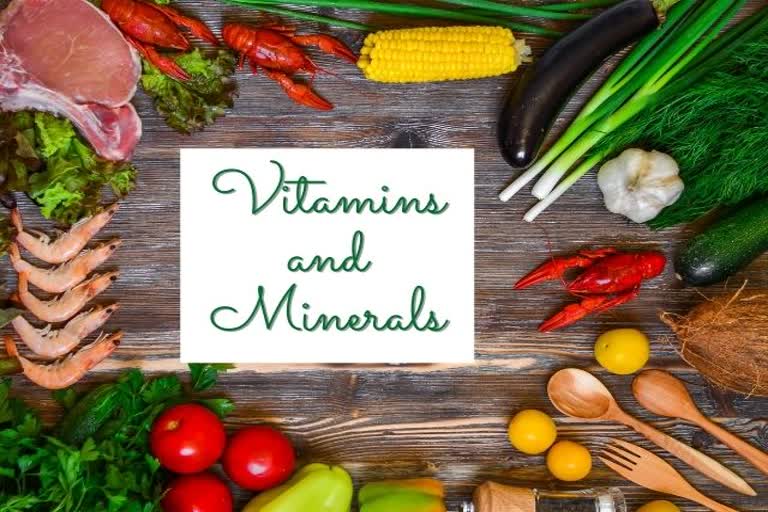Vitamins
It is very important for the development and functioning of our body systems. The body requires small amounts of various vitamins. The different types of vitamins and their sources are as follows:
- B1 - Grains and rice, pork, trout, black beans
- B2 - Beef liver, breakfast cereals, oats, yogurt, mushrooms, almonds
- B3 - Beef liver, chicken breast, brown rice, fortified cereals, peanuts.
- B5- Breakfast Cereals, Beef Liver, Shiitake Mushrooms, Sunflower Seeds
- B6- chickpeas, beef liver, tuna, chicken breast, fortified cereals, potatoes
- B7- Beef liver, egg, salmon, sunflower seeds, sweet potatoes
- B9- Beef liver, spinach, black-eyed peas, fortified cereals, asparagus
- B12 - Clams, beef liver, fortified yeast, plant milk, breakfast cereals, oily fish.
- Vitamin C – Contains citrus fruits, berries, red and green peppers, kiwi fruits, broccoli, baked potatoes, fortified juices.
- Vitamin A - sweet potatoes, beef liver, spinach, and other dark leafy greens, carrots, winter squash
- Vitamin D- cod liver oil, oily fish, dairy products, fortified juices
- Vitamin E - Wheat, nuts, seeds, sunflower and safflower oils, spinach
- Vitamin K - Leafy green vegetables, soybeans, edamame, okra, kiwi
Minerals
Without minerals, our body will neither be able to develop skin, muscles, tissues, and red blood cells nor will the different parts of our body receive oxygen. The exchange of messages between our brain and other organs of the body is also possible because of the minerals, which is why it is an essential part of our diet. There are 5 most important minerals,
calcium, magnesium, phosphorus, potassium, and sodium. Besides this, other important mineral elements are chromium, copper, iodine, iron, manganese and zinc.
- Potassium – This enables the kidneys, heart, muscles and nerves to function properly. Its deficiency can lead to low blood pressure, stroke and kidney stones. Avocados, coconut water, bananas, dried fruits, squash, beans and lentils are good sources.
- Sodium- It works to regulate fluid levels in the body, maintaining nerve and muscle function. Its excessive use increases the risk of high blood pressure, heart disease and stroke. Its main source is salt. Experts recommend consuming 2,300 milligrams of sodium a day, or about a teaspoon, but not more than that.
- Calcium- It also helps with bone health, nervous system, heart health and the operation of other systems. Its deficiency can cause weakness in bones and teeth, diseases and other health problems like excessive constipation, kidney stones and reduced absorption of other minerals. Good sources of calcium include dairy products, tofu, legumes and green leafy vegetables.
- Phosphorus- It is present in all cells of the body and contributes to the health of bones and teeth. Phosphorus deficiency can also cause anemia, a higher risk of infection, skin irritation or prickling, and confusion. Its major sources include dairy products, salmon, lentils and cashews.
- Magnesium– It contributes to muscle and nerve function and regulates blood pressure and blood sugar levels as well as enables the body to produce protein, build bones and DNA. Magnesium deficiency can cause weakness, nausea, fatigue, restless legs, sleepiness, and other symptoms. Nuts, spinach and beans are good sources of magnesium.
- Zinc– It plays a role in maintaining the body cells, immune system, wound healing and the formation of proteins. Its deficiency can cause hair loss, skin lesions, changes in taste or smell, and diarrhea and other digestive problems and headaches. Its major dietary sources include oysters, beef, cereals and baked beans.
- Iron– Iron is important for the formation of red blood cells, which play an important role in carrying oxygen to all parts of the body, forming connective tissue, and making hormones. Iron deficiency can lead to anemia, which can include problems related to digestion, weakness and difficulty in thinking. Good sources include whole grains, beef liver, lentils, spinach and tofu.
- Manganese – It is useful for energy in the body and in controlling blood clots and maintaining a good immune system. Its deficiency causes weak bones in children, skin rashes in men and changes in mood in women. Mussels, hazelnuts, brown rice, chickpeas and spinach are sources of manganese.
- Copper- Copper helps the body make energy and produce connective tissues and blood vessels. Its deficiency can cause body fatigue, skin patches, high cholesterol and connective tissue disorders. On the other hand, excess copper in the body can lead to heart problems, stomach pain, nausea and diarrhea. Too much copper also reduces the absorption of zinc. Good sources include beef liver, oysters, potatoes, mushrooms, sesame and sunflower seeds.
- Selenium- Selenium is made from more than 24 selenoproteins that play an important role in reproductive and thyroid health. As an antioxidant, it may also prevent cell damage, but too much selenium can cause symptoms such as bad breath, diarrhea, irritability, skin rashes and hair and nail problems. Its deficiency can cause heart disease, male infertility and gout. Brazil nuts, spinach, oatmeal, baked beans, tuna, ham and nutritious macaroni are excellent sources.
Also Read: What Are The Essential Nutrients For A Healthy Body?


